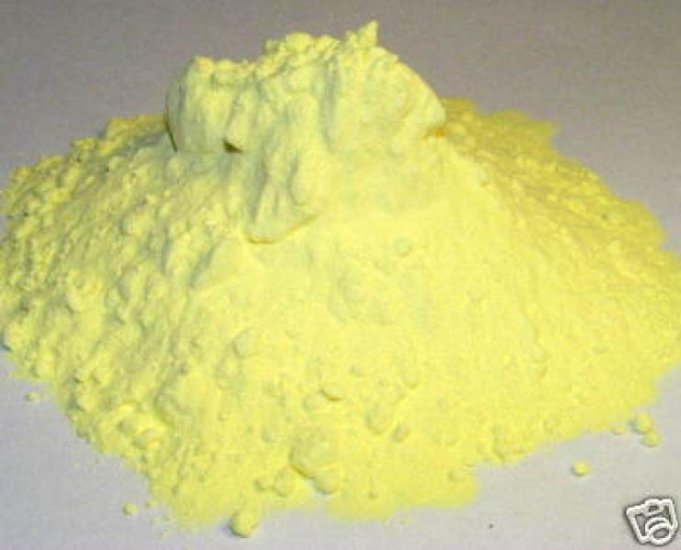What is flowers of sulphur?
Flowers Of Sulphur (FOS) is also known as yellow sulphur (sulfur) powder, is a bright yellow powder obtained from naturally-occurring volcanic brimstone deposits.
FOS is a natural mineral that has been used as a remedy for centuries. In ancient texts such as the bible it is called brimstone, and 2,000 years ago it was used as a remedy for skin disorders and other ailments.
You can buy flowers of sulphur at pet shops and animal stock feed stores. Farmers, those with animal stock, and pet breeders have used it for many decades, but the pharmaceutical and medical industries prefer that people do not know about it. It is too cheap and too effective.
Flowers of sulphur is not the same as MSM (methylsulfonylmethane), which is also a source of sulphur.
Sources of sulphur for health
Sulphur is a critical nutrient that is neglected an all but forgotten, even though it is the eighth most common element by mass in the human body. Surprisingly, there is no recommended Minimum Daily Requirement (MDR) for sulphur. Even though sulphur is basically ignored in nutritional circles, it is nonetheless a critical nutrient and one that is necessary for vibrant health and prevention of many degenerative diseases.
Those countries with the highest levels of sulphur in the soil, and whose people eat sulphur-rich foods, tend to have the healthiest populations. Greece, Italy and Japan are the primary suppliers of sulphur to the rest of the world, and they enjoy some of the lowest rates of heart disease and obesity. Their people also enjoy some of the longest lives on the planet.
The people who live traditional lives on volcanic islands such as Iceland and Indonesia, have remarkably low rates of depression, obesity, diabetes, heart disease and many other degenerative diseases. Some scientists thought that the Icelandic diet was protective against these diseases because of a high intake of fish, but further research showed that those Icelanders who moved to Canada and continued eating a lot of fish did not continue to enjoy the same low rates of these diseases.
Foods for sulphur. Egg yolks are the richest food source of sulphur. Many plant foods such as onions, garlic and cabbage contain sulphur, but the amount of sulphur is low unless the plants are grown in sulphur-rich soil.
Vitamin D and cholesterol. Healthy, non-burning sun exposure (with no sunscreen) helps your body make vitamin D in a sulphate form. While vitamin D is normally considered fat-soluble, vitamin D3 sulfate is actually water-soluble, which lets the sulphate form of vitamin D travel freely in the blood stream. Note: the vitamin D3 in supplements is not the same as the vitamin D3 you get from the sun and is not an adequate substitute.
Sunlight-exposed skin also produces large amounts of healthy and beneficial cholesterol sulfate.
Flowers of sulphur uses / properties / remedies / treatments
Flowers of sulphur is an antiseptic and antifungal. It is suitable for use on humans, animals, vegetables, fruits, flowers and as a gardening additive in the soil. It is safe to ingest in the correct quantities provided it comes from a reputable source.
- Skin. Dry, scaly, itchy, red skin. Relieves itching, reduces scratching.
Eczema, dermatitis.
Psoriasis.
Scabies.
Fungal infections such as ringworm, athlete's foot and jock itch.
Treats and heals nappy/diaper rash. - Metabolic Syndrome. Sulphur is critical to many of the body's biological processes. Without adequate sulphur, glucose metabolism is inhibited. You become glucose intolerant, energy is low, and all manner of skeletal and muscle disorders arise with pain and inflammation. This can lead to metabolic syndrome and weight gain. When sulphur deficiency occurs with a low fat diet, the problem becomes more serious as the additional sugars present in a low fat diet are converted to fat and released into the bloodstream as triglycerides which raise the risk of heart disease.

- Alzheimer's disease. An analysis of the minerals present in the cells of a typical Alzheimer's patient reveals that sulphur is almost non-existent compared with healthy people. Some research has shown that supplementing with sulphur can prevent Alzheimer's and even reverse it if the patient is still in the early stages where little brain damage has occurred. Could it be that the dramatic increase in Alzheimer's in recent years is caused by low-sulphur diets, in particular the avoidance of egg yolks?